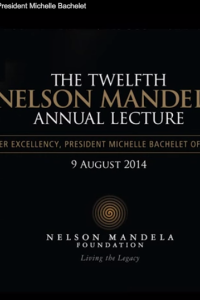On the morning of the 12th Nelson Mandela Annual Lecture on 9 August, the Lecturer, President Michelle Bachelet of Chile, gave two hours of her time to a conversation with two dozen South Africans on the challenges of reckoning with oppressive pasts.
Chilean President Michelle Bachelet
Hosted by Nelson Mandela Foundation (NMF) chairman Professor Njabulo Ndebele at The Mandela Rhodes Foundation, the conversation provided an intense dialogical exploration of the theme.
President Bachelet responded to an initial provocation by NMF director of research and Archive Verne Harris. He argued that South Africa’s pasts still weigh heavily on the country’s shoulders. “The levels of violence we see in our society – the rage – are not unconnected to the inadequacies of our reckoning with the past,” he said.
President Bachelet reflected on Chile’s experiences in reckoning with the Pinochet dictatorship, highlighting both commonalities and differences in relation to South Africa. She suggested that there could be no blueprint, but emphasised that “dirty wounds will not heal” and insisted on the importance of justice for crimes against humanity.
In the lively exchange that followed, she spoke frankly about the challenges posed by neo-liberal economic systems to countries like Chile and South Africa, arguing that it is this, rather than the oppression of the Pinochet regime, that has entrenched inequality in her country.
Reconciliation, or what President Bachelet prefers calling “re-encountering”, is fundamentally undermined by high levels of inequality and poverty. She conceded that government in Chile had made mistakes, and reflected on the need to acknowledge them and to learn from them.
NMF chief executive Sello Hatang said: “The level of engagement in this conversation with President Bachelet was profound. Her frankness and her depth of thought are inspiring. And she demonstrates a model of leadership which was exemplified by Nelson Mandela.”


